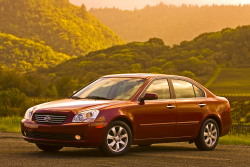
— A $95 million Kia Optima unintended acceleration lawsuit alleges the absence of a brake-throttle override system caused the deaths of 7-year-old twin boys from Tennessee.
The crash occurred on December 31, 2015, as 83-year-old Mary Parks was driving her 2008 Kia Optima with her sister as the passenger in the back seat.
Parks was only four miles from her home in Winchester, Tennessee, when her Optima slammed into the rear-end of a 2003 Ford Windstar stopped at a light. In the Windstar were parents Lynetta and John Hill, along with their 7-year-old twins James and John.
The lawsuit claims Parks was known as a slow and careful driver, yet witnesses said it looked like the Kia was out of control and traveling at high speeds. Before Parks was killed in the crash, she allegedly told her sister, who survived, that the car was uncontrollable and the brakes weren't working.
According to the lawsuit, Parks had enough time to not only repeatedly hit the brakes, but she also turned on the hazard lights and flashed her headlights to warn other drivers. The lawsuit also alleges Parks tried to shift the Optima into NEUTRAL but on top of that not working, she couldn't turn off the ignition.
The Kia slammed into the rear-end of the Hill's Ford Windstar with such force that the rear of the Ford was nearly pushed into the front seats. The speedometer of the Kia Optima got stuck at 90 mph from the force of the impact and although seriously injured, Mary Parks told police that she couldn't control the Kia Optima and told witnesses she had no braking control.
Parks later died at the hospital and the 7-year-old boys in the Ford Windstar were also killed. The boy's parents were seriously injured and believe the Kia Optima suffered from an unintended acceleration event that Mary Parks could do nothing about.
The lawsuit alleges the Optima had defects in the electronic throttle control system that caused sudden and uncontrollable acceleration, something that has allegedly caused other Kia and Hyundai models to take off on their own.
The plaintiffs say numerous parts of the Kia can cause the problem, including the accelerator pedal position sensors, engine control module and throttle position sensors.
Unlike older model vehicles, a central computer and not the driver’s action on the accelerator pedal controls the operation of the throttle by responding to wire-conducted signals from the accelerator pedal sensors which are relayed by wire to throttle position sensors that control an electrically operated throttle motor.
According to the Kia lawsuit, the automaker knew or should have known from engineering studies that the electronic throttle control system in the 2008 Kia Optima was susceptible to a sudden wide open throttle acceleration due to many conditions. The lawsuit says those conditions include the following:
- Electromagnetic interference to the electronic systems
- A load decrease caused or contributed to by an undercharged battery
- Brake switch adjustment faults
- Fluctuations in electric current capable of affecting electronic throttle controls
- A faulty connection in one or more accelerator pedal position sensors
- A faulty pin or pins in the harness connector for an accelerator pedal position sensor
- Wiring faults and excessive connector movement or vibration
- Loss of electronic compatibility
The plaintiffs also say the 2008 Kia Optima does not include protection against sudden throttle activation, something called a brake-throttle override, leading the parents to say Kia created the 2008 Optima with a complete disregard of human life.
A brake-throttle override is software that allows the brakes to take precedence over the throttle or accelerator if both brakes and throttle are activated at the same time.
Although Kia allegedly knew this technology can override a runaway throttle condition or throttle malfunction, the decision not to include brake-throttle override technology in the 2008 Kia Optima put at risk the lives and safety of consumers.
Other Kia owners have claimed they were involved in unintended acceleration events, including the driver of a 2013 Optima.
"I had an experience while driving on a 2 lane highway when the car accelerated very rapidly after I took foot of of gas pedal. I lost control and went across 2 lanes & median I was able to steer it at the end of 3 very scary out of control swerves. I was a mess, nervous wreck & afraid to drive it. Dealer, Mechanics blew me off."
In a 2012 case that got national attention, the driver of a 2011 Kia Sorento claimed her SUV experienced an unintended acceleration event that lasted 60 miles at speeds up to 120 mph.
The driver, Lauri Ulvestad, claimed she tried everything to get the SUV to slow down, including trying to shift into NEUTRAL, applying the emergency brakes and by trying to shut down the SUV equipped with a push-button start. Kia tested the vehicle and said the problem couldn't be duplicated.
The James and John Hill wrongful death lawsuit was filed in U.S. District Court Eastern District of Tennessee Winchester Division - Aaron and Lynetta Hill v. Kia Motors Corporation, Kia Motors America, et al.
The plaintiffs are represented by Keeton & Perry, PLLC.




